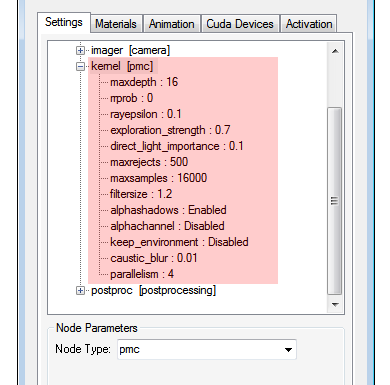
PMC is a custom mutating unbiased kernel written for GPUs. It allows for complex caustics and lighting to be resolved.
Maximum Depth (maxdepth)
The maximum number of times a ray can bounce/reflect/refract in a surface. Higher amounts mean also higher render time but more realistic results. For outdoor renders a good setting is around 4 maxdepth. For lighting interior with natural light (the sun and the sky) you will need higher settings such as 8 or higher. While high values are possible, in reality rays will not usually go beyond 16 ray depth.
Russian Roulette Probability (rrprob)
The RRprob is the probability of terminating the path randomly during raytracing. This value should be left as the default. A value of zero allows OctaneRender™ to determine the value.
Ray Epsilon (rayepsilon)
The ray epsilon is the distance to offset new rays so they don’t intersect with the originating geometry. This value should be left as the default.
Maximum Samples (maxsamples)
This sets the maximum number of samples per pixel before the rendering process stops. The higher the number of samples per pixel, the cleaner the render. There is no rule as to how many samples per pixel are required for a good render.
Filter Size (filtersize)
This sets the pixel size for filter for the render. This can improve aliasing artifacts in the render. If the filter is set too high, the image can become blurry.
Alpha ChannelA greyscale image used to determine which areas of a texture map are opaque and which areas are transparent. (alphachannel)
This option removes the background and renders it as transparent (zero alpha). This can be useful if the user wants to composite the render over another image and does not want the background to be present.
Keep Environment (keep_environment)
This option is used in conjunction with the Alpha Channel setting. It allows the background to be rendered with zero alpha but is still visible in the final render. This allows even further flexibility in compositing images.
Alpha Shadows (alphashadows)
If alpha maps are used in the scene, this setting controls whether the shadows will calculated from the mesh geometry or from the alpha map.
Exploration Strength (exploration_strength)
This specifies how long the kernel investigates good paths before it tries to find a new path. Low values can create a noisy image while larger values can create a splotchy image.
Direct Light Importance (direct_light_importance)
The direct light importance makes the kernel focus more on paths with indirect light. For example, imagine sunlight through a window creates a bright spot on the floor. If the direct light importance is 1, the kernel would sample this area a lot, although it becomes clean very quickly. If the direct light importance is reduced, the kernel reduces its efforts to sample that area and focuses more on more tricky areas that are more difficult to render.
Max Rejects (maxrejects)
This can control the bias of the render. By reducing the value, the result will be more biased, but the render time will be shorter.
For interior render done with emitters, or where light is illuminating the scene through specular materials, a high (1.0) “caustic_blur” value is recommended to reduce the time it takes to remove noise from the render.
